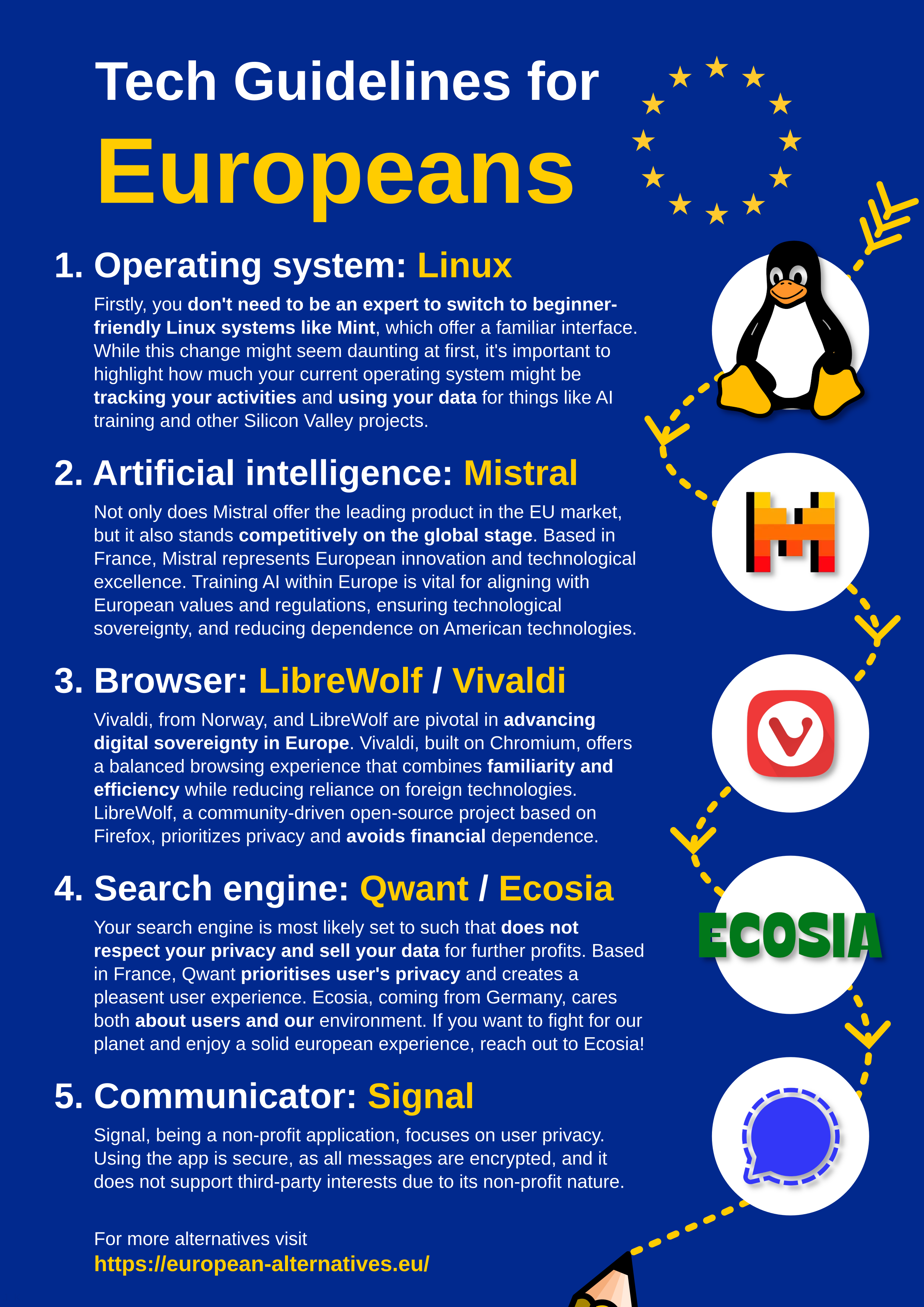Buy European
Overview:
The community to discuss buying European goods and services.
Rules:
-
Be kind to each other, and argue in good faith. No direct insults nor disrespectful and condescending comments.
-
Do not use this community to promote Nationalism/Euronationalism. This community is for discussing European products/services and news related to that. For other topics the following might be of interest:
-
Include a disclaimer at the bottom of the post if you're affiliated with the recommendation.
-
No russian suggestions.
Feddit.uk's instance rules apply:
- No racism, sexism, homophobia, transphobia or xenophobia.
- No incitement of violence or promotion of violent ideologies.
- No harassment, dogpiling or doxxing of other users.
- Do not share intentionally false or misleading information.
- Do not spam or abuse network features.
- Alt accounts are permitted, but all accounts must list each other in their bios.
- No generative AI content.
Useful Websites
-
General BuyEuropean product database: https://buy-european.net/ (relevant post with background info)
-
Switching your tech to European TLDR: https://better-tech.eu/tldr/ (relevant post)
-
Buy European meta website with useful links: https://gohug.eu/ (relevant post)
Benefits of Buying Local:
local investment, job creation, innovation, increased competition, more redundancy.
European Instances
Lemmy:
-
Basque Country: https://lemmy.eus/
-
🇧🇪 Belgium: https://0d.gs/
-
🇧🇬 Bulgaria: https://feddit.bg/
-
Catalonia: https://lemmy.cat/
-
🇩🇰 Denmark, including Greenland (for now): https://feddit.dk/
-
🇪🇺 Europe: https://europe.pub/
-
🇫🇷🇧🇪🇨🇭 France, Belgium, Switzerland: https://jlai.lu/
-
🇩🇪🇦🇹🇨🇭🇱🇮 Germany, Austria, Switzerland, Lichtenstein: https://feddit.org/
-
🇫🇮 Finland: https://sopuli.xyz/ & https://suppo.fi/
-
🇮🇸 Iceland: https://feddit.is/
-
🇮🇹 Italy: https://feddit.it/
-
🇱🇹 Lithuania: https://group.lt/
-
🇳🇱 Netherlands: https://feddit.nl/
-
🇵🇱 Poland: https://fedit.pl/ & https://szmer.info/
-
🇵🇹 Portugal: https://lemmy.pt/
-
🇸🇮 Slovenia: https://gregtech.eu/
-
🇸🇪 Sweden: https://feddit.nu/
-
🇹🇷 Turkey: https://lemmy.com.tr/
-
🇬🇧 UK: https://feddit.uk/
Friendica:
-
🇦🇹 Austria: https://friendica.io/
-
🇮🇹 Italy: https://poliverso.org/
-
🇩🇪 Germany: https://piratenpartei.social/ & https://anonsys.net/
-
🇫🇷 Significant French speaking userbase: https://social.trom.tf/
-
🇵🇱 Poland: soc.citizen4.eu
Matrix:
-
🇬🇧 UK: matrix.org & glasgow.social
-
🇫🇷 France: tendomium & imagisphe.re & hadoly.fr
-
🇩🇪 Germany: tchncs.de, catgirl.cloud, pub.solar, yatrix.org, digitalprivacy.diy, oblak.be, nope.chat, envs.net, hot-chilli.im, synod.im & rollenspiel.chat
-
🇳🇱 Netherlands: bark.lgbt
-
🇦🇹 Austria: gemeinsam.jetzt & private.coffee
-
🇫🇮 Finland: pikaviestin.fi & chat.blahaj.zone
Related Communities:
Buy Local:
Continents:
European:
Buying and Selling:
Boycott:
Countries:
Companies:
Stop Publisher Kill Switch in Games Practice:
Banner credits: BYTEAlliance
view the rest of the comments

user@domain.com/resource. Theuser@domain.compart identifies the user and their home server, and the/resourceidentifies the specific client device they are using (e.g.,alice@example.com/mobileoralice@example.com/laptop)./resourcepart of the JID can reveal the type of client or device being used.Signal uses Sealed Sender (wired.com). Imagine if letters you sent didn't require a "from" field - or it was inside the envelope and impossible for anyone to see it. The post office would only know who its going to and only the recipient can decrypt it (open the letter) to see who sent it. Now, you could say, well they have your IP and can correlate it to the account, but the easy way around this is to either use a VPN or Signal proxy (support.signal.org) if you're that paranoid.
Read more about it here: Technology preview: Sealed sender for Signal (signal.org)
Most email providers suffer similar metadata leaks as XMPP because:
You could host your own email, XMPP, or Matrix server - that's definitely a win for privacy. But as soon as you interact with someone outside your ecosystem (server), metadata leakage is an issue again. It's why making end-to-end encrypted email is a hard problem to solve. It's not that it can't be secure, its that it has to work with those that aren't because that's the expectation.
Until you interact with others who aren't using encryption or have it misconfigured.